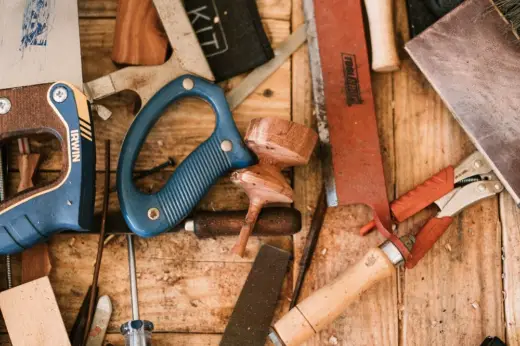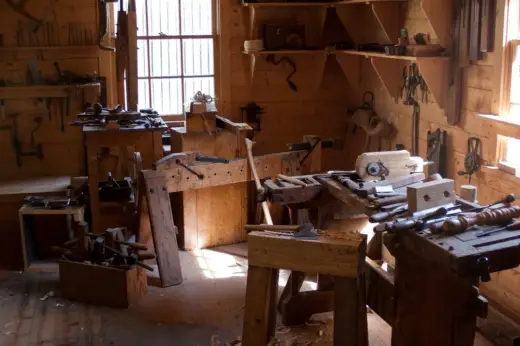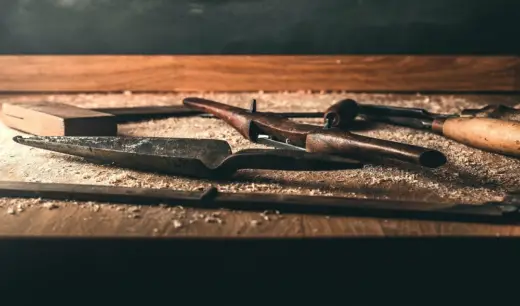Tool bags for carpenters tips, Property builing work advice, Home woodworking guide
Tool Bags For Carpenters
11 February 2022
Imagine it’s your first day at work, and you can’t find the nail box or speed square.
The very thought sends a chill down the spine, doesn’t it? Whether a weekend warrior or professional carpenter, organizing your implements can save you the troubles of rummaging the toolshed.
Though you can lug a tool belt or carry a cumbersome toolbox, it will only weigh you down. Besides keeping your equipment organized, a good tool bag also bears the brunt of the burden, and that’s why it’s popular.
Plus, it has plenty of room, which means you can toss all the essential tools you’ll need in the workplace. And honestly, it is frustrating when you’re unable to find the right bag for your tools. But don’t worry; we’ll walk you through the nitty-gritty of tool bags and help you choose the right one.
So, let’s get started!
Best Tool Bags For Carpenters
Having all the tools in one place can save you unnecessary panic at the workplace while also completing the task with ease. On top of that, if your job involves a lot of traveling, you can stuff all the tools in a bag.
This way, your efficiency wouldn’t be affected, and you won’t have to go back and forth to the garage or workshop to get the tools for the job.
And nothing’s more frustrating than not being able to find the right tool bag for your needs. That said, we’ve listed all the essential factors that you need to consider while shopping for a tool bag. So, let’s take a look.
1. Size
When you’re out for work, you wouldn’t want to go home or workshop to get the tools needed at the site. While most people prefer tool boxes or tool belts, they have limited storage and can only store some devices. So, the first thing a carpenter must consider while shopping for tool bags is their size.
In our opinion, a carpenter’s tool bag must be able to hold all the essential accessories that they’ll need for an entire day on the site. While most people make the mistake of getting an oversized bag, you can go for a medium-sized one.
However, make sure not to go for a compact bag, or you’ll have to take all the tools out to get hold of the right one. So, assess the tools you have to carry on a day-to-day basis and the nature of the task before deciding which bag to go for.
2. Accessibility
No doubt, tool pouches are convenient, but they are small and can only accommodate a handful of tools. So, if you’re working on something big, it’s best to get a tool bag that lets you pull large tools without any difficulty.
If you go for a bag with a small opening, you will face difficulty fitting bigger tools. As a result, your bag will tear, tools will get damaged, and, of course, you’ll end up with scraped hands.
Though bags that are open on top let you access all your devices easily, it isn’t the best choice. That’s because if the bag tips over, your tools will come out and scatter all over the place.
However, you can go for bags that expand to their full width as it is a more secure option.
3. Durability
Without a doubt, a carpenter’s work is messy, and their bag is usually stuffed with heavy and sharp tools. This is why the one you opt for must be strong enough to withstand a bit of rough handling.
So, when you’re in the market for buying bags, opt for the one made of durable material. Heavy-duty polyester fabric, vinyl, or leather are some of the materials you can consider investing in as their durability is top-notch.
On top of that, it must also feature strong rivets, premium-quality fasteners, robust seams with sturdy stitching; only then will it stand up to the rigors of the job.
4. Compartments
A tool bag must have enough compartments to keep squares, utility knives, and small tools. If a bag consists of only a single pocket, finding small tools will become tedious, affecting your productivity.
So, we suggest you search for bags that offer a variety of compartments, multi-leveled structures, along with other smart inserts and folds. Only when you get hold of a bag that offers all these features, we suggest you take the plunge and buy it. This way, you’ll be able to arrange the tools conveniently, so you wouldn’t have to fish any while working on the field.
5. Portability
Another aspect that you will have to consider is portability, as it will make it easy for you to move from one space to another. Since carpenters are always on the go, you must not forget to check the weight of the bag.
Going for a heavyweight bag is a big no-no! That’s because you’ll find it cumbersome to move from one place to another, which will, of course, affect your productivity. So, a tool bag must be lightweight and comfortable to hold so you can carry it on your shoulders easily.
To be on the safe side, you can go for a bag that features a shoulder strap and handles so you can carry it easily. Moreover, extra features such as adjustable straps and buckle lengths will make it user-friendly.
6. Extra Features
Besides adjustable straps, bags with special pockets or zippers, holders, long straps, and unique dimensions are helpful for carpenters. Moreover, bucket-shaped bags are also available, so you can opt for that one if you want.
Before you decide, we suggest considering your day-to-day activities and seeing which bag fits the bill. For instance, if your job demands constant traveling from one site to another, going for a belt bag or over-the-shoulder is the best bet.
Meanwhile, a duffel-style or bucket bag is an excellent option for those who stay in one place as you get enough space to store your tools and can also access it without much effort.
Tool Belt And Other Accessories
Not to deny, a tool bag adds much convenience as you can keep all the essential tools in one place and also makes it easy for you to commute from one area to another. However, simply buying a tool bag isn’t enough as there are other accessories you can consider to simplify your task.
One such item that you can consider purchasing alongside the bag is a tool belt that makes it easy for you to move in the worksite. It is particularly useful for those who work in a large site as they cannot always pull their heavy bag, so they can use a tool belt for carrying all the essential tools.
Moreover, you can also attach a gorilla hook to the tool belt so you can work more efficiently at the construction site.
Frequently Asked Questions
Q. Which Tool Bags Are Durable?
Bags made of leather, nylon, polyester, and canvas are highly durable, which means they will withstand rips and tears and rough handling.
Q. Which Tool Bag Provides Ample Space For Storing Tools?
A duffel-style or bucket bag provides enough space for storing tools, which is why carpenters who handle large-scale tasks must opt for these bags.
Summing It Up
There you have it – everything you need to know about buying a tool bag for carpentry. Honestly speaking, a well-organized tool bag not only doubles your efficiency but also saves energy and time so you can complete all the tasks in a jiffy.
Besides a tool bag, don’t forget to get a tool belt so you can carry all the essential tools in it when working on a large site.
Thus, it’s finally time to wrap our guide; hopefully, you enjoyed reading it as much as we enjoyed curating it for you. When shopping for tool bags, simply keep the points mentioned above in your mind, and we’re confident you’ll make an informed choice.
Until next time, happy woodworking!
Comments on this tips on tool bags for carpenters article are welcome.
Glasgow Building Designs
Glasgow Architecture Designs – architectural selection below:
50 Bothwell Street Office News

image courtesy of architects practice
50 Bothwell Street Office Redevelopment
Comments / photos for the Tool bags for carpenters advice page welcome



